Nothing Found
It seems we can’t find what you’re looking for. Perhaps searching can help.
It seems we can’t find what you’re looking for. Perhaps searching can help.
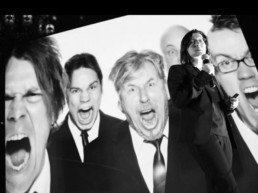
Vitai Brakovskai ir 10+ gadu darba pieredze valsts un pašvaldību jomā, 9+ gadu starptautiska pieredze radošās domāšanas rosināšanā Baltijā un NVS, 18+ gadu praktiska pieredze darbā ar NVO cilvēkresursu attīstību, 1000+ pasākumu vadīšana indivīda uzņēmējspēju aktivizēšanai. Vita pilda Latvijas tautsaimniecībai būtisku sociālu funkciju – sniedz konsultatīvu atbalstu ideju autoriem, jauniešiem un jaunajiem uzņēmējiem, palīdzot tiem “testēt” savas idejas un veidot “ceļa karti” idejas sekmīgākai īstenošanai. Vitas atziņa: „Uzskatu, ka Latvija joprojām ir Iespēju zeme ikvienam, kas ir gana drosmīgs, lai ļautu izpausties savam „radošajam Džinam” un atmestu „kāpņu telpas” sindromu. Kombinējot izglītību un uzņēmību, ikviens var nokļūt tur, kur citi vēl tikai sapņo nokļūt! Novēlu ikvienam piedzīvot „uzvaras garšu”, atļaujoties dažkārt domāt un darīt CITĀDI – tādejādi iegūstot brīvību pār saviem darbiem un lēmumiem!”
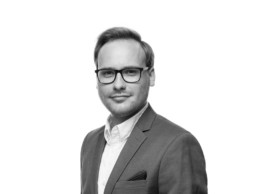
Kopš 2014. gada Miks Celmiņš vada Eiropas Komisijas atbalstītus projektus lauku reģionos Eiropā, Āzijā un Āfrikā. Minētajos reģions Miks kopā ar pasaules ietekmīgākajiem sociālajiem uzņēmējiem un organizācijām ir attīstījis un realizējis vairāk nekā 35 starptautiskus mobilitātes projektus, kur ar sociālo inovāciju palīdzību tiek risinātas sabiedrībai nozīmīgas problēmas. Izstrādātie projekti veicina lauku reģionu attīstību tādās sfērās kā lauksaimniecība, izglītība, veselība, nevienlīdzības mazināšana un sociālās uzņēmējdarbība. 2015. gadā Miks bija viens no līdzdibinātājiem Eiropas Savienības Globālajai sociālo pārmaiņu ekosistēmai “Make Room”, kas kopš 2017. gada ir paplašinājusies un darbojas arī Latvijā, Itālijā, Rumānijā, Indijā un Nigērijā. Šobrīd viņš vada “Make Room” Eiropas pārstāvniecības, kā arī ir “Make Room” iniciatīvas “Changemakers’ Room” globālo un Āfrikas forumu priekšsēdētājs. 2016. gadā Miks tika apbalvots ar Pasaules Ekonomikas foruma balvu “Iconic Leaders in Social Empowerment”, kā arī 2017. gadā tika izvēlēts starp 8000 pieteikumiem kā viens no 50 Eiropas Savienības – Āzijas jaunajiem līderiem “zem 30”.
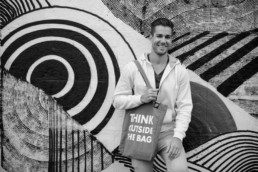
Christoph Hantschk ir ekonomists un sociālais uzņēmējs. Apgūstot uzvedības ekonomiku Vīnes Universitātē un Jaunajā Dienvidvelsas universitātē Sidnejā, viņš savu karjeru sāka vairākos tradicionālajos un arī start-up uzņēmumos, tomēr viņa sapnis vienmēr ir bijis radīt pozitīvu ietekmi sabiedrībā. Sekojot savam aicinājumam, Christoph pameta ikdienas darbu un sāka veltīt laiku un enerģiju, lai risinātu mūsdienu sociālās un ekoloģiskās problēmas. Savā sociālajā uzņēmumā “goodbag” viņš liek lietā uzvedības ekonomikā apgūtās zināšanas, lai radītu platformu, kas motivē sabiedrību saudzēt vidi. Christoph atzīst, ka laiks kopš “goodbag” dibināšanas ir kā brauciens pa atrakciju kalniņiem ar daudz kritieniem, bet vienmēr uz priekšu.
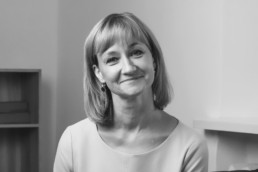
“Cēsu Jaunās pamatskolas” mērķis ir kvalitatīvas un mūsdienīgas pirmsskolas un pamatizglītības pieejamība reģionā, ārpus galvaspilsētas. Mācību pieeja un īpaši izveidotā vide radīta tā, lai izglītība būtu pieejama jebkuram bērnam, neatkarīgi no viņa spējām, vajadzībām vai personiskajām īpašībām, un ikviens varētu sasniegt savu augstāko iespējamo rezultātu. Skola piedāvā arī izglītojošus pasākumus gan vecākiem, gan speciālistiem, kas ikdienā strādā ar bērniem, kā arī skolas pārstāvji aktīvi iesaistās publiskās diskusijās par šodienas izglītības kvalitāti, iespējām to pilnveidot, rosina speciālistu un sabiedrības iesaisti pārmaiņu realizēšanā izglītībā. “Cēsu Jaunā pamatskola” veidojas par sociāli aktīvas kopienas centru, tādējādi radot pozitīvas pārmaiņas arī vietējā sabiedrībā. Agnese Pilsuma ar savu pieredzi un zināšanām skolai pievienojās 2017. gadā. Viņa redz, ka “Cēsu Jaunā pamatskola” pastāvēs, kamēr ģimenēm šāda izglītības pieeja būs nepieciešama.
https://www.facebook.com/JaunaSkola/
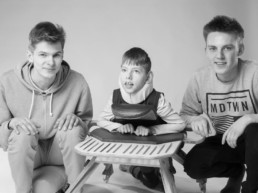
SIA “KK Original Design” ir sociālais uzņēmums, kas rada speciālus pārvietošanās palīglīdzekļus cilvēkiem ar kustību traucējumiem. Absolvējot Liepājas Mūzikas, mākslas un dizaina vidusskolu, Valters Krētainis izstrādāja kvalifikācijas darbu “Solis pa solim”, radot rāpuli – pārvietošanās palīglīdzekli bērnam ar cerebrālo trieku, uz kā pamata arī tika dibināts jaunais sociālais uzņēmums. Valters to vada kopā ar draugu – uzņēmuma līdzdibinātāju Ģirtu Tomu Klampi. Ar savu darbu jaunieši vēlas ne vien atvieglot dzīvi cilvēkiem ar kustību traucējumiem, bet arī veicināt sabiedrības izpratni par šo cilvēku dzīvesveidu. Šobrīd uzņēmums piedāvā produktu sēriju “Solis pa solim”, kas sevī ietver trīs funkcionālā dizaina palīglīdzekļus – “CitronŠķēle”, “CitronPuse” un “Rāpulis”. Ierīces ir košas, atraktīvas savā veidolā, piemērotas patstāvīgiem treniņiem gan mājas apstākļos, gan terapijas nodarbībās.
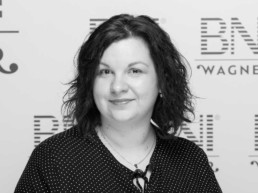
Zvanu centrs “Sonido” ir sociāls uzņēmums, kas nodrošina darba vietas sociālā riska grupām, sniedzot klientiem uzziņas vairākās valodās. Zvanu centra peļņa tiek novirzīti sociālajam projektam „Parunāsim?”, kas piedāvā vientuļiem cilvēkiem iespēju zvanīt pa speciāli izveidotu tālruni 26564564 un tikt uzklausītiem. “Ikdienā strādājot zvanu centrā, vairākkārt nācies saskarties ar situāciju, kad cilvēki, zvanot uz informatīvo tālruni, patiesībā zvana nevis, lai iegūtu informāciju, bet gan, lai parunātos, justos sadzirdēti un uzklausīti. Ir bijuši gadījumi, kad cilvēki pat atliek konkrētu naudas summu, lai piezvanītu un parunātos pa “Sonido” maksas tālruni. Tā arī radās ideja par “Parunāsim?” – bezmaksas sarunu, kur ikviens var būt uzklausīts, saņemot apliecinājumu, ka katra saruna ir svarīga. Turklāt saruna ir pamats gan mūsu emocionālajai, gan fiziskajai pašsajūtai. Šī vieglā saziņas forma ir jāizmanto, jo tas ir efektīvākais veids, kā, izrunājot savas problēmas, iespējams gūt emocionālo labsajūtu un būt patīkamam līdzcilvēkam” – Inga Muižniece.
https://www.facebook.com/sonidolv/
https://www.facebook.com/parunasimartevi
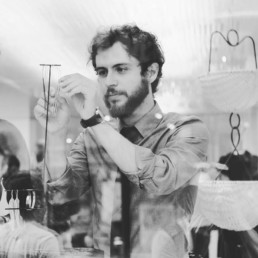
Andrei M. Georgescu ir “Mesteshukar ButiQ” /MBQ/ veiksmes atslēga. “MBQ” ir sociālais uzņēmums, kas radījis jaunu nozīmi tradicionālajām romu tautības amatprasmēm un ievērojami cēlis šīs etniskās minoritātes dzīves līmeni Rumānijā. Paralēli darbam “MBQ” Andrei ir konsultējis vairākus sociāli orientētus uzņēmumus Eiropā par to, kā veidot sadarbības starp tradicionālajiem un sociālajiem uzņēmumiem, radot pievienoto vērtību abiem tirgiem.
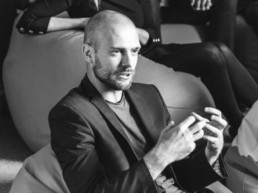
Ernests Štāls ir uzņēmējs, start-up vides eksperts un aktīvists. Somijas akseleratora rīkotajā pasākumā “Startup Sauna” 2016. gadā Ernesta start-up projekts “Dripit.io” tika izvēlēts kā akseleratora “supervaronis” un ieguva 100 000 eiro investīciju no somu riska kapitāla fonda “Superhero Capital”. Ernests ir arī viens no jaunuzņēmumu iedvesmas konferences “TechChill” organizatoriem, jauno tehnoloģiju koprades telpas “Techhub Riga” dibinātājs un valdes priekšsēdētājs.
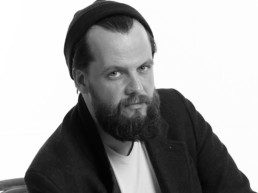
Fions Dobins ir dizaina konsultāciju uzņēmuma “AGE5” un sociālā zīmola “MAMMU” radošais direktors un līdzdibinātājs. Kā inovāciju dizaineris un radošais konsultants viņš ir strādājis ar vairāk kā 30 dažādiem zīmoliem, tajā skaitā General Motors, BASF and ADIDAS. Jau vairāk kā 10 gadus darbojoties arī sociālā biznesa nozarē, Fions ir Baltijas valstīs ir izveidojis akseleratoru, attīstījis “Grameen Creative Lab” and “Yunus Social Business” sociālās uzņēmējdarbības pasākumus un darba grupu formātus. Viņš vienlaikus arī pasniedz lekcijas par radošo domāšanu un sociālo uzņēmējdarbību vairākās vadošajās biznesa skolās visā pasaulē.